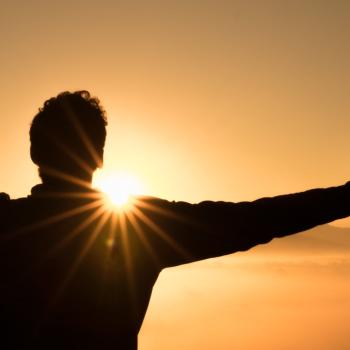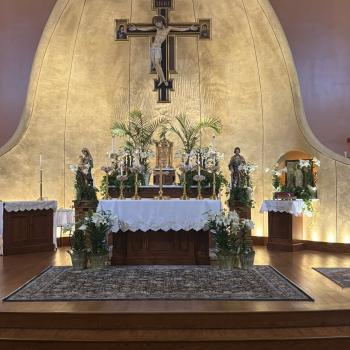I talked to a number of different ministers who were also very vocal pro-life activists, and Rev. Rob Schenck was the first person who said, I agree with you and if I say it publicly I'll probably be in deep doo-doo, but I can't pretend I don't see this anymore. And that's why he agreed to work with me on this.
You say that you were prepared to dislike Rob Schenck, and all of the pastors you first interviewed, because of your differing views from them on so many issues. Rev. Schenck, in particular, was one of the founders of Operation Rescue, and had been on the frontline of abortion clinic protests. And yet somehow making this movie together created a friendship between you two. How did the relationship begin and how did it end?
Well, hopefully it doesn't end! I do think we'll be friends forever. He really is a good man and I enjoy our friendship enormously. And I suspect we'll work together on things going forward, because we have similar ways of understanding the world.
It began for me in trepidation. I was actively afraid of him, maybe because I had an authoritarian father and he was this scary guy and Rob seemed scary. It also felt a little bit like I was being a traitor to my own political relationships to sit down with him at all. I was afraid of taking flack from my own side or compromising my own ideas.
So the first thing I said to Rob was, listen, I've Googled you and you've Googled me, and we could get into a big fight right now and walk away really angry, or we could take this volatile issue that we feel very differently about, and we could just set it aside for now. Instead let's talk about everything else. I know you do what you do because you genuinely believe what you believe, and you're not a horrible hater of women. If you'll accept that I'm not a baby murderer and that I'm a decent person, we can then see what happens.
And that's exactly how it unfolded and that's exactly why we became friends, because we refused to ascribe the worst motivations to each other. We did set aside the question of choice and life at that time, though we talk about it quite freely now. Now there's a friendship and trust, and now there's some ground on which we can disagree and still believe the other is a decent person.
The friendship has been an enormous surprise to me, partly because I probably was carrying some prejudices in that first interaction. And probably because I thought the political differences ran deeper than they really do. I think there are people out there who are very invested in all of us being afraid to talk to each other. The ease with which these walls came tumbling down was to me as much of a lesson in the process of making this film as any other single thing.
And that's what happens in the movie as well. Walls come tumbling down on the part of the pastor and the lawyer who represented Lucy McBath as well. What can you tell us about the experience of the characters in the movie? Did making this movie change them as well as it changed you?
Yes, I do think so. What's interesting about this film is that we really didn't know what we were making, honestly. We reached out to Rob, and we reached out to John Phillips, Lucy's lawyer, and then Lucy became very interesting to us. So we just kind of followed the film as it unfolded in front of us. People are really behaving in real time; Rob is really on a journey and he's genuinely learning and changing in real time on camera.
And that is an extraordinary thing. I cannot believe he trusted us with that, but he did. We built enough of a bond that he was able to be vulnerable, make mistakes, admit he was wrong in places and assert himself in other places, and find his way to a different set of ideas. It's kind of astonishing. That's what I love about him on film. He shows that it's actually possible to change your mind.
What did you feel your role was in telling this story and what were you hoping to accomplish for us as the viewer?
I know in my heart that the only thing that changes people is stories. That's been inherited from my family. It really does change hearts. The best films don't close you down, they open you up. I'm also an activist, I'm a persuader. I hate it when nobody agrees with me, but I knew that the higher purpose was served by not being a persuader with this film, but by simply sitting with a lot of different feelings and deep spiritual exploration. It was good to entertain the possibility that there's something you didn't understand, that you could change, and that there are things that good people are doing that maybe aren't working out well for society.
I want this film to open the conversation. I don't want it to shut anything down. We're all better the more open we are. That's what I like about Rob's journey; he widens.
This film is strongly grounded in a religious context. Have your other films been so faith-based or is this the first one to be so squarely located in religion?





